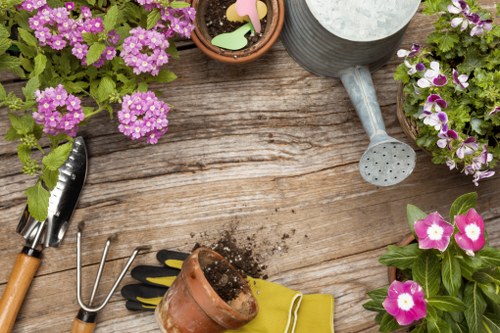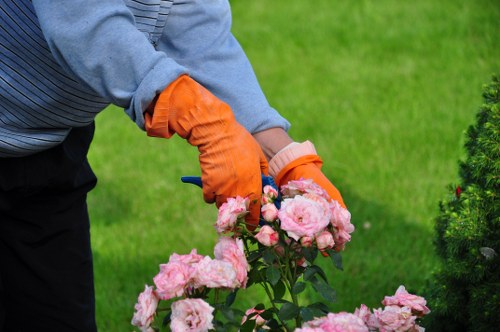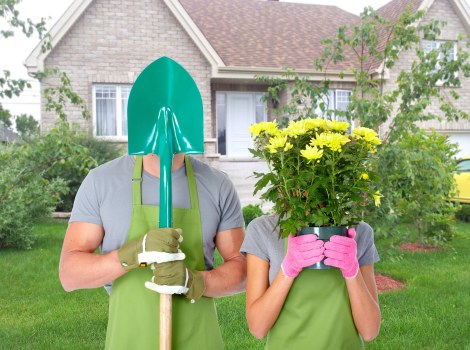Complete Guide to Garden Clearance Using Stump Grinders
Introduction to Garden Clearance

Maintaining a beautiful garden often requires periodic garden clearance, which involves removing unwanted plants, debris, and especially tree stumps. Utilizing a stump grinder can significantly streamline this process, making your garden maintenance more efficient and aesthetically pleasing.
Garden clearance is not just about aesthetics; it plays a crucial role in the overall health of your garden. Clearing out old plant matter and removing stumps can prevent pests and diseases from taking hold, ensuring that your garden remains vibrant and healthy throughout the year.
In this comprehensive guide, we'll explore the essentials of garden clearance with a focus on stump grinding, providing you with the knowledge needed to tackle your garden projects effectively.
The Importance of Stump Removal

Stump removal is a critical component of garden clearance. Leaving stumps in your garden can lead to several issues, including safety hazards, unsightly landscapes, and potential obstacles for future planting.
From a safety perspective, stumps can be tripping hazards, especially in high-traffic areas of your garden. They can also attract unwanted wildlife, such as termites and other pests, which may pose a threat to the health of your other plants.
Moreover, stumps can hinder the growth of new vegetation. They take up space that could be used for new plants and can interfere with the proper installation of irrigation systems or other garden features.
Understanding Stump Grinders

A stump grinder is a powerful machine designed to pulverize tree stumps into small chips or mulch. These machines come in various sizes and configurations, making them suitable for different types of garden clearance projects.
Stump grinders typically feature a rotating cutting wheel with sharp teeth that grind down the stump into wood chips. The depth and efficiency of the grinding process depend on the grinder's size and the operator's skill.
Using a stump grinder not only saves time compared to manual removal methods but also reduces the physical effort required, making it an ideal tool for both amateur gardeners and professional landscapers.
Benefits of Using a Stump Grinder

- Efficiency: Quickly removes stumps without the need for extensive manual labor.
- Cost-Effective: Reduces the cost associated with hiring professional services for stump removal.
- Versatility: Suitable for various stump sizes and types of wood.
Additionally, stump grinders are environmentally friendly. They minimize the disruption to the surrounding soil and vegetation, allowing your garden to recover quickly after the clearance process.
By converting stumps into mulch, these machines also contribute to soil enrichment, providing valuable organic material that can support the growth of new plants.
Choosing the Right Stump Grinder

When selecting a stump grinder for your garden clearance needs, several factors should be considered to ensure optimal performance and efficiency.
Size and Power
The size of the stump grinder should correspond to the size of the stumps you intend to remove. Smaller gardens with smaller trees may only require a compact, lightweight grinder, while larger properties with more robust trees might benefit from a heavy-duty model.
Portability
Portability is another important consideration. If your garden spans a large area or includes various terrains, a portable stump grinder with wheels or tracks may offer the flexibility needed to navigate different environments.
Ease of Use
Opt for a stump grinder that is user-friendly, especially if you plan to operate it yourself. Features such as easy access to controls, clear visibility of the grinding area, and straightforward maintenance procedures can enhance your overall experience.
Preparing for Garden Clearance

Before commencing garden clearance with a stump grinder, proper preparation is essential to ensure safety and effectiveness.
Assessing the Area
Begin by evaluating the area where stump grinding will take place. Identify the location of utility lines, such as underground cables or gas pipes, to prevent accidental damage during the grinding process.
Gathering Necessary Tools
In addition to the stump grinder, you may need safety gear like gloves, goggles, and sturdy footwear. Having the right tools on hand will facilitate a smoother and safer clearance operation.
Removing Debris
Clear the work area of any loose debris, rocks, or obstacles that could interfere with the stump grinder's operation. This step also minimizes the risk of damaging the equipment.
Step-by-Step Guide to Using a Stump Grinder

- Positioning the Grinder: Place the stump grinder in front of the stump, ensuring that the cutting wheel is aligned properly.
- Starting the Machine: Follow the manufacturer's instructions to start the stump grinder safely.
- Grinding the Stump: Slowly lower the cutting wheel onto the stump, making steady passes to grind down the wood.
- Removing the Remains: After grinding, remove the remaining wood chips and debris from the area.
- Filling the Hole: Fill the ground with the wood chips or fresh soil to complete the clearance.
Always operate the stump grinder with caution, adhering to safety guidelines to prevent accidents and ensure effective removal.
Safety Tips for Stump Grinding

- Always wear appropriate safety gear, including gloves and eye protection.
- Ensure the area is free from obstacles and bystanders before operating the grinder.
- Keep hands and limbs away from the cutting area during operation.
Additionally, perform regular maintenance on your stump grinder to keep it in optimal condition. This includes inspecting the cutting wheel for damage, ensuring all moving parts are lubricated, and checking for any signs of wear and tear.
By following these safety protocols, you can minimize risks and enjoy a hassle-free garden clearance experience.
Post-Clearance Garden Maintenance

After completing the garden clearance, it's important to maintain the area to prevent future issues.
Soil Aeration
Aerate the soil to improve its structure, allowing better water absorption and root growth for new plants. This can be achieved using garden forks or aeration tools.
Planting New Vegetation
Consider introducing new plants or trees to replace those that were removed. Choose species that are well-suited to your garden's conditions to ensure successful growth.
Mulching
Apply a layer of mulch to the cleared area to retain moisture, suppress weeds, and enrich the soil. This also enhances the garden's appearance, providing a clean and finished look.
Environmental Considerations

Engaging in responsible garden clearance practices supports environmental sustainability.
Recycling Wood Chips
The wood chips produced by stump grinders can be repurposed as mulch, compost, or natural pathways, reducing waste and benefiting other aspects of your garden.
Minimizing Soil Disruption
Using a stump grinder minimizes soil disturbance compared to manual removal methods, preserving the soil's natural structure and microorganism balance.
Preventing Erosion
Proper garden clearance helps prevent soil erosion by removing structures that can disrupt water flow. This is particularly important in areas prone to heavy rainfall or winds.
Choosing Professional Services vs. DIY

Deciding between hiring professional garden clearance services or undertaking the project yourself depends on various factors, including the size of your garden, the number of stumps, and your personal expertise.
Advantages of Professional Services
- Expertise and experience ensure efficient and thorough stump removal.
- Access to high-quality equipment that may not be feasible to purchase for one-time use.
- Time-saving, allowing you to focus on other aspects of garden maintenance.
Benefits of DIY Stump Grinding
- Cost savings by eliminating labor expenses.
- Flexibility to work at your own pace and schedule.
- Satisfaction of completing the project personally.
Cost Factors in Garden Clearance

The cost of garden clearance using a stump grinder varies based on several factors.
Size and Number of Stumps
Large stumps or a greater number of stumps will require more time and resources, increasing the overall cost.
Equipment Rental vs. Purchase
Renting a stump grinder for a single project is often more economical than purchasing one, especially for occasional use.
Labor Costs
If you opt for professional services, labor costs will be a significant part of the total expense. DIY projects can help reduce these costs.
Environmental Impact of Stump Grinding

Using a stump grinder for garden clearance has several positive environmental impacts.
Reduction of Waste
Stump grinding minimizes organic waste by converting stumps into reusable wood chips, reducing the need for disposal.
Enhancing Soil Health
The resulting wood chips contribute to soil health by providing mulch that retains moisture and enriches the soil with organic matter.
Promoting Biodiversity
Efficient garden clearance creates a healthier environment for various species of plants and wildlife, promoting biodiversity in your garden.
Common Challenges in Garden Clearance

While stump grinding simplifies garden clearance, certain challenges may arise during the process.
Difficult Soil Conditions
Hard or rocky soils can make stump grinding more laborious and may require additional equipment or techniques to overcome.
Hidden Utilities
Underground utilities can pose risks during stump removal. Always ensure that all utility lines are identified and marked before commencing work.
Stubborn Stumps
Certain types of trees produce stumps that are more resistant to grinding, requiring multiple passes or higher-powered equipment to remove effectively.
Tips for Effective Stump Grinding

- Plan Ahead: Carefully map out the area to identify potential obstacles and plan the grinding path accordingly.
- Regular Maintenance: Keep the stump grinder well-maintained to ensure consistent performance.
- Proper Technique: Use slow, steady movements to avoid damaging the equipment and to achieve a more thorough grind.
Implementing these tips can enhance the efficiency and effectiveness of your garden clearance efforts, leading to better results and a more manageable project.
Post-Grinding Cleanup and Restoration

Removing Wood Chips
After grinding, collect the wood chips and decide how to utilize them. They can be spread as mulch, used in compost, or removed completely from the site.
Soil Leveling
Fill the dug area with fresh soil to level the ground, preparing it for new planting or landscaping features.
Planting and Landscaping
With the area cleared and restored, you can proceed to plant new vegetation or add other landscaping elements to enhance your garden's beauty.
Final Thoughts on Garden Clearance

Effective garden clearance is essential for maintaining a healthy and attractive garden. Using a stump grinder simplifies the process, offering a blend of efficiency, cost-effectiveness, and environmental benefits.
Whether you choose to undertake the project yourself or hire professionals, understanding the fundamentals of stump grinding and garden clearance will empower you to make informed decisions, leading to a thriving and well-maintained garden.
Don’t let unwanted stumps and debris detract from your garden’s potential. Contact us today to learn more about our garden clearance services or book your service now to transform your outdoor space.